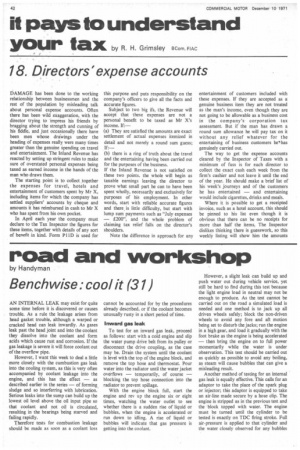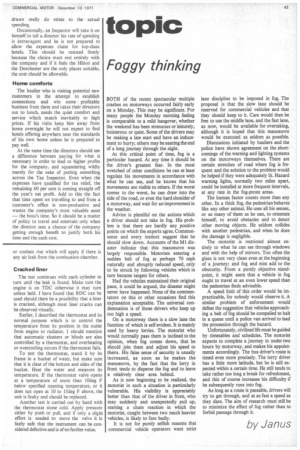it pays to understand
Page 44

Page 45

If you've noticed an error in this article please click here to report it so we can fix it.
ypurtax by R. H. Grimsley BCorn, FIAC
8. Directors' expense accounts
DAMAGE has been done to the working relationship between businessmen and the rest of the population by misleading talk about personal expense accounts. Often there has been wild exaggeration, with the director trying to impress his friends by bragging about the strength and cunning of his fiddle, and just occasionally there have been men whose dra:wings under the heading Of expenses really were many times greater than the genuine spending on travel and entertainment. The Inland Revenue has reacted by setting up stringent rules to make sure of overstated personal expenses being taxed as earned income in the hands of the man who draws them.
The starting point is to collect ,together the expenses for travel, hotels and entertainment of customers spent by Mr X, including items for which the company has settled suppliers' accounts by cheque and amounts it has reimbursed in cash to Mr X who has spent from his own pocket.
In April each year the company must declare to the Tax Inspector the figures for these items, together with details of any sort of benefit in kind. Form PI ID is used for this purpose and puts responsibility on the company's officers to give all the facts and accurate figures.
Subject to two big ifs, the Revenue will accept that these expenses are not a personal benefit to be taxed as Mr X's income. If:— (a) They are satisfied the amounts are exact settlement of actual expenses itemized in detail and not merely a round sum guess; If:—
(b) there is a ring of truth about the travel and the entertaining having been carried out for the purposes of the business.
If the Inland Revenue is not satisfied on these two points, the whole will begin as taxable earnings leaving the director to prove what small part he can to have been spent wholly, necessarily and exclusively for purposes of his employment. In other words, start with reliable accurate figures and there, is little difficulty, but start with lump sum payments such as "July expenses — E200", and the whole problem of claiming tax relief falls on the director's shoulders.
Note the difference in approach for any entertainment of customers included with these expenses. If they are accepted as a genuine business item they are not treated as the man's income, even though they are not going to be allowable as a business cost in the company's corporation tax assessment. But if the man has drawn a round sum allowance he will pay tax on it without any relief whatever for the entertaining of business customers helms genuinely carried out.
The way to get the expense accounts cleared by the Inspector of Taxes with a minimum of fuss is for each director to collect the exact cash each week from the firm's cashier and not leave it until the end of the year. He should make a brief list of his week's journeys and of the customers he has entertained — and entertaining would include cigarettes, drinks and meals.
Where it is possible to get a receipted invoice, such as a hotel account, this should be pinned to his list even though it is obvious that there can be no receipts for more than half the items. The Inspector dislikes thinking there is guesswork, so this weekly listing will show him the amounts drawn really do relate to the actual spending.
Occasionally, an Inspector will take it on himself to tell a director his rate of spending is extravagant and he is not prepared to allow the expenses claim for top-class hotels. This should be resisted firmly because the choice must rest entirely with the company and if it feels the Hilton and the Dorchester are the only places suitable, the cost should be allowable.
Home comforts
The haulier who is visiting potential new customers in the attempt to establish connections and win some profitable business from them and takes their directors out to lunch, needs the quiet comfort and service which match inevitably to high prices. If his visits keep him away from home overnight he will not expect to find hotels offering anywhere near the standards of his own home unless he is prepared to pay well. • At the same time the directors should see a difference between paying for what is necessary in order to lead to higher profits for the company, and squandering wildly merely for the sake of putting something across the Tax Inspector. Even when the expenses have qualified for tax relief, the rethaining 60 per cent is coming straight off the year's net profit. Add to this the fact that time spent on travelling to and from a customer's office is non-productive and wastes the company's most valuable asset — the boss's time. So it should be a matter of policy to travel and entertain only when the director sees a chance of the company getting enough benefit to justify both his time and the cash cost.




































































































